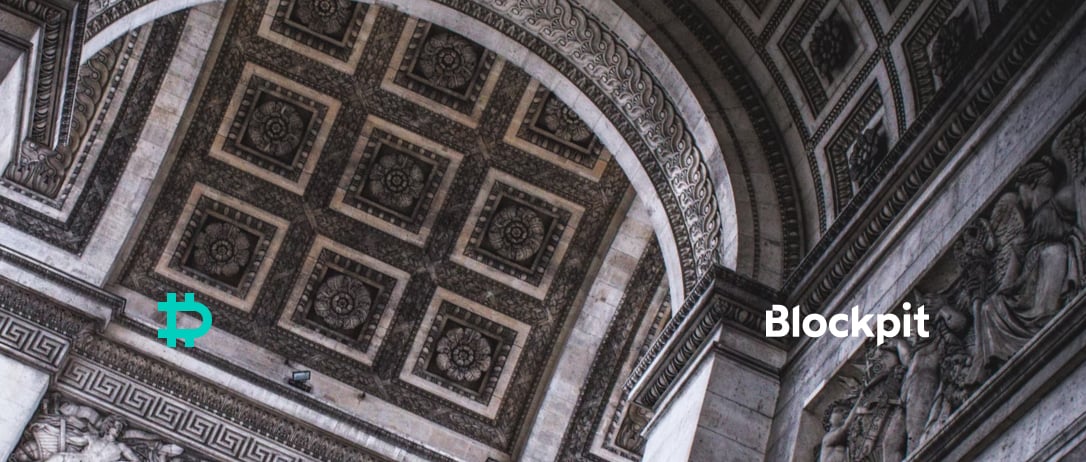
France has one of the most active populations engaging in all things crypto: Bitcoin, NFTs, the metaverse. The Parisian proverb for a typical day “metro – boulot – dodo” (Metro, work and sleep) is now being replaced with “metro – crypto – dodo”. However, in order to enjoy the profits of a successful crypto trade, one has to accept the necessity to pay the taxes. Here is a little guide on the how, what and when of crypto taxes in France.
In France, crypto assets are considered a moveable asset, treated like stocks, bonds, and other capital assets. While they do not have the legal status of a currency, they are accepted as a medium of exchange.
Like any moveable asset, if you earn money or make a capital gain from disposing of crypto, it is taxed as an ordinary income, depending on how you got your crypto-assets and how you used them.
In France, you will create a taxable event only when you convert your crypto to fiat and when you receive crypto profits from activities like mining. You will not owe taxes when you buy crypto, trade, swap or exchange crypto among wallets. However, the amount of tax you pay will depend on whether you are a professional trader or an occasional investor.
When do I pay crypto tax in France?
To put it simply, you should pay taxes when there is a taxable event. In the French tax regime, a taxable event is created only in two scenarios.
Selling crypto assets for fiat currency
Sale of crypto assets and its rights in return for government-issued fiat currency creates a taxable event. For example, when you bought 0.1 Bitcoin in June 2018 for 1,000€ and sold it for 1,800€ in August 2020, you made a capital gain of 800€. This is a taxable event.
Crypto profits received from mining
Profits gained from mining also create a taxable event in France. These mining rewards are treated as non-commercial profits. However, there are also different tax rules for professional miners carrying out commercial activities.
How is crypto taxed in France?
The tax rate applicable for capital gains and income from crypto assets depends on whether you’re a professional trader, an occasional investor or a miner.
The DGFiP ( General Directorate of Public Finances) declares that capital gains from the sale of crypto assets like bitcoins are taxed as:
- Occasional investors – flat tax rate of 30%
- Professional traders – BIC tax regime of 0-45%
- Crypto Miners- BNC tax regime of 0-45%
Am I an occasional investor?
Occasional investors must pay a type of Income-tax called a Single Fixed Levy (PFU) or ‘Flat Tax’ as it is known in France. This is a flat rate because it does not consider your tax bracket and your tax income base.
The DGFiP will only tax capital gains from crypto when crypto is converted into fiat currency if the total capital gain exceeds 305€ per year.
There are no hard and fast instructions in the French tax law on how to decide whether crypto trading is occasional or on a regular basis, but it clearly states that this is viewed on a case-by-case basis. However, the DGFiP will base its decision on whether you’re an occasional investor or a professional trader based on the following.
- The total amount invested
- The total trade volume
- The frequency of crypto sales
When do I not have to pay crypto taxes?
- “Exchange” and “swap” of crypto assets
- Gifting crypto assets to family and friends
- ICOs and IEOs Initial Coin Offerings (ICO) and Initial Exchange Offerings (IEO)
- Airdrops, bounties, hard fork, master node, lending and staking
- DeFi (Decentralized Finance)
- Margin Trading and Future Trading
- NFTs
Note that as long as you don’t convert your gains into Fiat, you don’t pay taxes for the above actions. However, if you sell an NFT with a gain and exchange it for Euro, then you have to pay the taxes on the gains.
What happens if I don’t pay crypto tax?
If you fail to report your capital gains from crypto, you are punished with a fine of 750€ for each unreported account, or 125€ for omission or inaccuracy, up to a limit of 10,000€ per declaration. These amounts of 750€ and 125€ are respectively increased to 1,500€ and 250€ when the value of the accounts exceeds 50,000€ at any time during the year.
Having cleared that up, we declare to our friends from France: enjoy your financial liberties in crypto, but don’t forget to pay your taxes!
Get started with Blockpit
Blockpit is a European provider for crypto tax and compliance services. Their crypto tax app on blockpit.io allows holders of digital assets to make their taxes fast, comfortable and with ease. While the software is functional in all European countries, Blockpit offers certified tax frameworks in Germany, France, Spain, Austria and Switzerland to give users to best possible tax filing:
AUTHOR(S)
